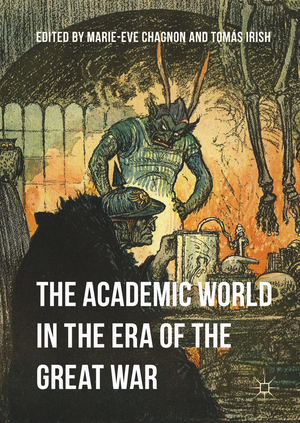The Academic World in the Era of the Great War
Editat de Marie-Eve Chagnon, Tomás Irishen Limba Engleză Hardback – 27 oct 2017
| Toate formatele și edițiile | Preț | Express |
|---|---|---|
| Paperback (1) | 683.90 lei 38-44 zile | |
| Palgrave Macmillan UK – 23 aug 2018 | 683.90 lei 38-44 zile | |
| Hardback (1) | 729.53 lei 6-8 săpt. | |
| Palgrave Macmillan UK – 27 oct 2017 | 729.53 lei 6-8 săpt. |
Preț: 729.53 lei
Preț vechi: 889.68 lei
-18% Nou
Puncte Express: 1094
Preț estimativ în valută:
139.59€ • 145.76$ • 115.27£
139.59€ • 145.76$ • 115.27£
Carte tipărită la comandă
Livrare economică 16-30 aprilie
Preluare comenzi: 021 569.72.76
Specificații
ISBN-13: 9781349952656
ISBN-10: 1349952656
Pagini: 276
Ilustrații: XIII, 276 p.
Dimensiuni: 148 x 210 mm
Greutate: 0.5 kg
Ediția:1st ed. 2018
Editura: Palgrave Macmillan UK
Colecția Palgrave Macmillan
Locul publicării:London, United Kingdom
ISBN-10: 1349952656
Pagini: 276
Ilustrații: XIII, 276 p.
Dimensiuni: 148 x 210 mm
Greutate: 0.5 kg
Ediția:1st ed. 2018
Editura: Palgrave Macmillan UK
Colecția Palgrave Macmillan
Locul publicării:London, United Kingdom
Cuprins
Introduction; Marie-Eve Chagnon, and Tomás Irish.- Part I: Mobilisations.- Off Campus: German Propaganda Professors in America, 1914-1917; Charlotte Lerg.-Men of Science: The British Association, Masculinity, and the First World War; Heather Ellis.- Junior Faculty, National Education and the (re) making of the Academic Community in the Russian Empire During and After the Great War; Alexander Dmitriev.-Part II: Ruptures.-‘Despite Wars, Scholars Remain the Great Workers of the International’. American Sociologists and French Sociology During the First World War; Andrew Johnston.-Trinity College Dublin: An Imperial University in War and Revolution, 1914-1921; Tomás Irish.- A World in Collapse: How The Great War Shaped Waldemar Deonna's Theory on Europe's Decline; Christina Theodosiou.- Part III: Demobilisations.- ‘The Domain of the Young as the Generation of the Future’: Student Agency and Anglo-German Exchange After the Great War; Tara Windsor.- “Can the Science of the World Allow This?” German Academic Distress, Foreign Aid, and the Cultural Demobilization of the Academic World, 1919-1925; Elisabeth Piller.- American Scientists and the Process of Reconciliation in the International Community; Marie-Eve Chagnon.- Negotiated Truth: The Franco-German Historians Agreement of 1951 and the Long History of Cultural Demobilization After the First World War; Mona Siegel.- Conclusion: Reflections on the Academic World and the Great War: Recalling Wissenschaft Als Beruf, 1917-2017; Roy MacLeod.
Notă biografică
Tomás Irish is Lecturer in Modern History at Swansea University, UK. He is the author of The University at War 1914-25: Britain, France and the United States (Palgrave, 2015), and Trinity in War and Revolution 1912-23 (2015).
Marie-Eve Chagnon is part-time faculty member at the Université du Québec à Montréal, Canada. Her current research looks at the role played by the American scientific community in the reconciliation process entre les guerres.
Textul de pe ultima copertă
This book examines the ways in which scholarly expertise was mobilized during the First World War, and the consequences of this for the inter-connected academic world that had developed in the late nineteenth century. Adopting a strong international approach, the contributors to this volume examine the impact of the War on individuals, institutions, and disciplines, cumulatively demonstrating the strong afterlife of conflict for scholarly practices and academic communities across Europe and North America, in the decades following the cessation of the Great War.
Caracteristici
Focuses on the transnational networks of scholars, institutions, and ideas which flourished in the late-nineteenth century 'Academic World' Provides a comparative, international, and multi-disciplinary approach to how the Academic World engaged with the First World War Challenges the traditional periodisation of the Great War by arguing that rupture and demobilization occurred at different times and with differing degrees of intensity Includes supplementary material: sn.pub/extras
